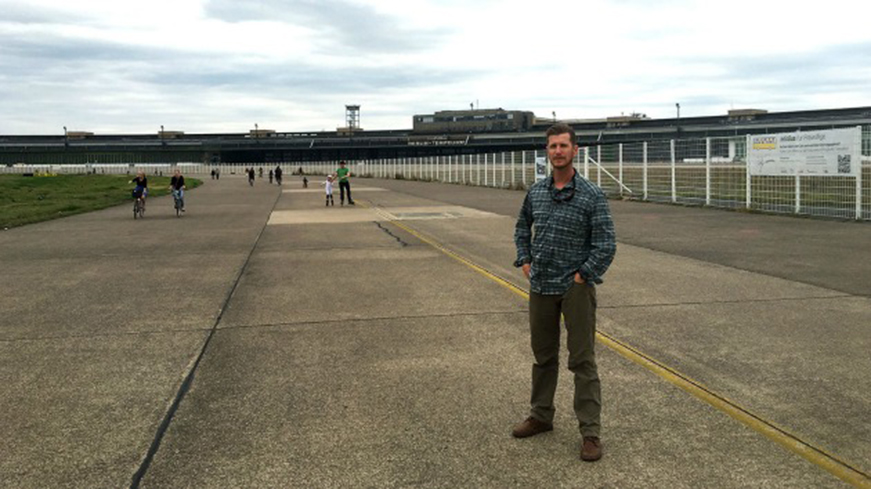
UVA Darden Student to Help Shepherd Unaccompanied Minors Leaving Calais Camp
By Caroline Newman
The refugee camp outside Calais, France, has become a symbol of Europe’s struggle to accommodate more than a million migrants and refugees from war-torn countries in the Middle East or Africa. This week, the French government has begun the process of closing the camp, and University of Virginia Darden School of Business student Seth Hooper (Class of 2017) will be on hand to transition unaccompanied minors into French custody.
Authorities are hoping to prevent the sort of loss that happened in March, when the southern portion of the camp was closed and at least 129 children went missing.
Hooper, a former U.S. Army medic and medical operations officer, is now a Second Year in Darden’s Global Executive MBA program. While at Darden, he founded his startup, Respit Solutions, to create a better shelter system for refugees and victims of natural disaster. His team is currently developing a system that uses refurbished shipping containers to deliver all of the essential services supporting a refugee camp, including medical services, electrical and communications support and toilet and shower facilities.
Hooper traveled to Calais last month and returned this week to help execute a transition plan that he developed with L’Auberge des Migrants and other humanitarian groups working in the camp. Once there, he will help the aid organizations gather young refugees with no parents or guardians and assist officials in transferring them into French custody so that they can determine the best place to house them after the camp closes. French officials estimate that roughly 1,000 young people in the camp are unaccompanied minors. The camp is expected to be closed no later than Oct. 31.
For Hooper, Calais’ ad hoc setup embodies a problem that Respit Solutions is trying to solve. Respit’s system seeks to standardize the infrastructure of a refugee camp. The company also plans to offer consulting services to predict potential crises and get resources in place.
“Our goal is to pre-sell and pre-stage our systems ahead of the time of need. This would change two things. First, it would move the industry from one of ad hoc reaction to disaster to one of planned response. Second, it would cut response times based on the ad hoc model of three to four weeks to time in transit from where the systems are stored,” Hooper said.
Hooper and his team — which includes four Darden classmates — have also traveled to Tempelhof Airport in Berlin, which houses about 1,300 refugees in a former airport terminal that dates back to the Nazi era. The airport is broken up into various sections, with different relief agencies taking care of different needs, and is well-integrated with the community, with a community park adjacent to the building.
“We see Templehof as a validation of what we are trying to do, because it takes a systemic approach,” Hooper said. “Many places do not have a building like that available, however, and a resource like ours could accomplish something similar.”
Hooper is also relying on insights gleaned during his 12 years in the Army, where he focused on disaster planning and medical operations.
“In the military, I learned that just reacting to disaster doesn’t work. You need resources, logistics and experts to be able to implement a standardized plan,” he said. “In order to have good outcomes, you have to have resources in place for when bad things happen.”
Serving in the Army, as well as witnessing the effects of major natural disasters in places like New Orleans and Haiti, convinced him that there had to be a better way to quickly house refugees and displaced persons.
“I started thinking about, if you reverse-engineered a refugee camp, what would it look like?” Hooper said. “That’s how I got the idea for the Respit system.”
Darden’s Global Executive MBA Program, which includes several weeklong international residencies, offered the input Hooper needed to turn his idea into a business.
“Coming to Darden, I wanted three things: to get a world-class education based on the case study method, to join an alumni network that really supports one another and to start my own business,” Hooper said. “I have really enjoyed all three of those.”
Hooper spent the summer traveling to refugee camps in Europe and developing his idea in as a member of the 2016 i.Lab Incubator program. His team is now finalizing prototypes of their design and seeking $250,000 in grants to build five prototypes. Hooper hopes to send three to Europe, while two remain in the U.S.
After testing the prototypes, Hooper will begin a round of fundraising. In the interim, as the prototype is being finalized, he is applying to the Axel Springer Plug and Play Accelerator in Berlin, which would allow him to continue the progress made in the iLab.
This article originally appeared in UVA Today.
The University of Virginia Darden School of Business prepares responsible global leaders through unparalleled transformational learning experiences. Darden’s graduate degree programs (MBA, MSBA and Ph.D.) and Executive Education & Lifelong Learning programs offered by the Darden School Foundation set the stage for a lifetime of career advancement and impact. Darden’s top-ranked faculty, renowned for teaching excellence, inspires and shapes modern business leadership worldwide through research, thought leadership and business publishing. Darden has Grounds in Charlottesville, Virginia, and the Washington, D.C., area and a global community that includes 18,000 alumni in 90 countries. Darden was established in 1955 at the University of Virginia, a top public university founded by Thomas Jefferson in 1819 in Charlottesville, Virginia.
Press Contact
Molly Mitchell
Senior Associate Director, Editorial and Media Relations
Darden School of Business
University of Virginia
MitchellM@darden.virginia.edu




